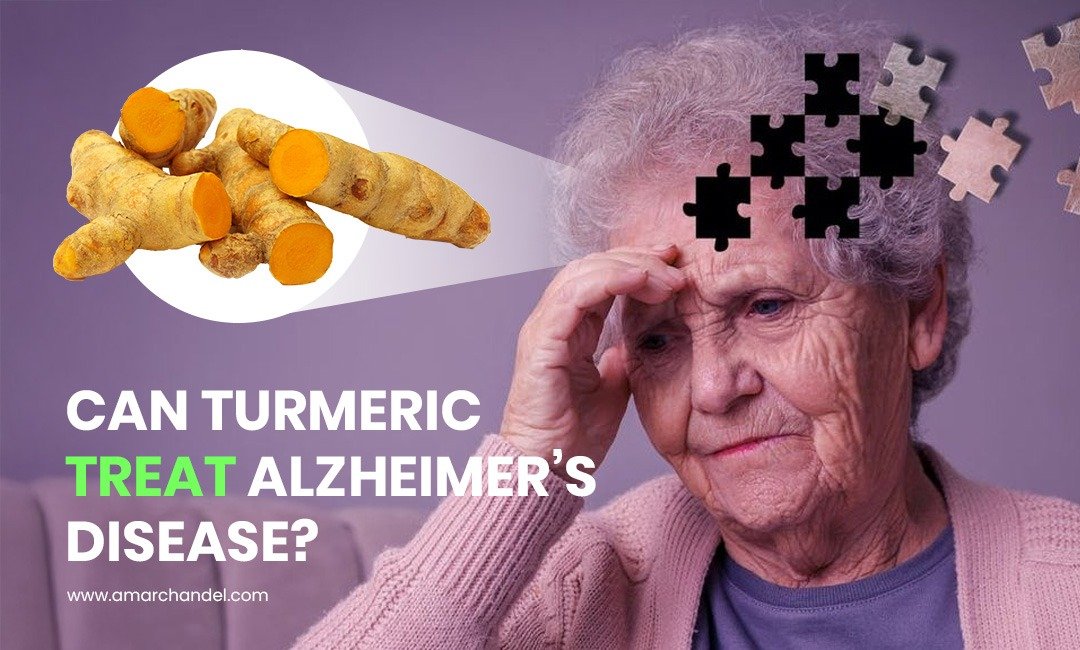Turmeric (Curcuma longa), a cornerstone of Indian cuisine and traditional medicine, has long been studied for its potential to treat or delay Alzheimer’s disease (AD). The active component curcumin is thought to exert antioxidant, anti-inflammatory, and anti-amyloid effects. But what does modern research say?
In 2012, a small but widely cited case series described three Alzheimer’s patients who took about 1 tsp of turmeric daily. Over months to a year, each experienced relief from agitation, anxiety, apathy, and hallucinations, along with improved social recognition and caregiver burden reduction. One woman’s MMSE score improved by five points—from 12 to 17. These functional, qualitative improvements were reported with no adverse effects.
However, two randomised controlled trials using high-dose curcumin supplements (2–4 g/day) in Alzheimer’s patients failed to show improvements in cognition or biomarkers. Despite good tolerability in most participants, plasma curcumin levels remained very low due to poor bioavailability, and the trials found no significant effect on clinical outcomes over 24–48 weeks.
Animal and laboratory studies consistently show that curcumin and turmeric can:
• Inhibit β-amyloid aggregation and promote plaque clearance
• Reduce tau protein accumulation and neuroinflammation
• Increase brain-derived neurotrophic factor (BDNF)
• Support synaptic function and antioxidant enzymes
In transgenic Alzheimer’s mouse models, oral turmeric or curcumin reduced oxidative stress, Aβ deposits, and inflammatory markers, restoring memory and synaptic markers—even at low doses.
A 2024 Brazilian review concluded curcumin supplementation may restore BDNF levels, modulate monoamines, and reduce aluminum-induced neurotoxicity, offering broad neuroprotective effects.
A 2023 randomised, placebo-controlled trial in Kerala evaluated a high-bioavailability curcumin formulation (CurQfen) in 48 patients with moderate AD over six months. Those receiving the curcumin blend showed significant improvement in MMSE cognitive scores and improved locomotor function, along with better serum biomarkers (BDNF increase, Aβ42/tau reduction, lower IL‑6 and TNF‑α) compared to placebo and standard curcumin groups.
This is the first Indian trial to demonstrate clinical and biomarker benefits with an advanced turmeric preparation.
What About India’s Low Historic Dementia Rates?
Older studies suggested rural India had Alzheimer’s incidence rates 4‑fold lower than in the U.S., leading some to attribute this to lifelong turmeric intake. But later reviews cautioned that studies were small, short-term, and confounded by underdiagnosis, genetic factors (APOE4), and other dietary differences. While turmeric may play a role, such epidemiological associations are inconclusive.

Practical Takeaways
• Whole-food turmeric (e.g., a teaspoon daily in curries or golden milk) may help manage behavioural symptoms in Alzheimer’s, as seen in early case series—though this evidence remains anecdotal.
• Standard curcumin supplements (2–4 g/day) have not shown efficacy—most likely due to poor absorption in conventional forms.
• A new Indian RCT using highly bioavailable curcumin showed positive cognitive and biochemical outcomes, marking a promising step for future research.
• Mechanistically, turmeric supports brain health via anti‑amyloid, anti‑inflammatory, and neurotrophic pathways—even if isolated curcumin has limitations.
• For most Indians, integrating turmeric into daily cooking (with fat and black pepper to aid absorption) is safe and may confer mild neuroprotective benefits—but it should not replace standard medical care.
References
1. Nozomi Hishikawa et al. (2012): Three case reports of turmeric improving Alzheimer’s behavioral symptoms
2. Lim et al. (2012–2013): 24-week RCTs of curcumin in AD found no clinical benefit due to low bioavailability
3. Reddy et al. (2018): Curcumin protects against Aβ toxicity, improves synaptic and oxidative markers in AD mice
4. Brazilian review (2024): Curcumin restores BDNF and reduces amyloid and tau pathology
5. Das et al. (2023): Indian double-blind RCT using CurQfen-curcumin showed cognitive and biomarker improvements in AD patients
6. Neuronutrition review (2012): Lower observed AD rates in India vs U.S.; turmeric consumption hypothesised as a factor

